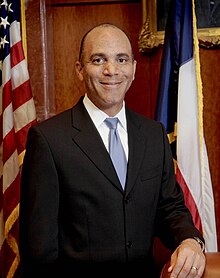Most of what Texas Supreme Court Chief Justice Wallace Jefferson had to say to the Lege during his biennial address was good stuff that I hope the Lege will heed.
Presenting his State of the Judiciary speech to Texas lawmakers, Jefferson said that “wrongful convictions leave our citizens vulnerable, as actual perpetrators remain free” and recommended the Legislature create a commission “to investigate each instance of exoneration, to assess the likelihood of wrongful convictions in future cases, and to establish statewide reforms.” He cited the recent exoneration of Michael Morton, who spent nearly 25 years in prison for murder.
The creation of such a commission nearly passed in 2011, but failed at the last minute. Part of the opposition has come from Jeff Blackburn, chief legal counsel of the Innocence Project of Texas, a nonprofit organization that attempts to overturn wrongful convictions and investigate why they happen in the first place. He said recently that such a commission would have to be “extremely well-funded,” and would more likely become “a paper commission that would give a lot of people an excuse to turn away from a lot of the real issues we face in the criminal justice system.”
But the bill creating such a commission, House Bill 166, by state Rep. Ruth Jones McClendon, D-San Antonio, got a favorable review from the House Criminal Jurisprudence Committee on Tuesday.
Jefferson also pushed for indigent defense and more money for civil legal aid. “We must do more,” he said, “to keep the courthouse doors open for all of our neighbors.” He called on lawmakers to increase the amount of funding dedicated to organizations that provide indigent civil legal aid and criminal defense.
Jefferson touted reforms in creating an electronic filing system to lessen the use of paper in courts statewide. “Our courts operate much like they did in 1891,” he said, “with paper, stamps on paper, cabinets for paper, staples, storage, shredding of paper.” He backed Senate Bill 1146, by state Sens. Royce West, D-Dallas, and Robert Duncan, R-Lubbock, to decrease the cost of electronic filing, which he called “a key to ensuring access to our judicial system.
“The era of big paper is over,” he said, prompting laughs and applause from lawmakers.
Finally, Jefferson announced the creation of a special committee of the Texas Judicial Council to look at reforming the state’s guardianship system, in which court appointees make decisions and manage the interests of incapacitated individuals. “An exploding elderly population will stress the guardianship system,” he said. “We must begin to address these issues and prepare.” Currently, he said, Texas has 368 state-certified guardians handling 5,000 guardianships. The number of individuals needing guardianship, he said, is 40,000.
The Statesman has more:
Jefferson also criticized the practice of writing Class C misdemeanor tickets for disruptive conduct in Texas schools, forcing children to answer the charge in court and leaving some, particularly those who cannot afford a lawyer, vulnerable to arrest and a criminal record.
About 300,000 such tickets are written each year, he said.
“We are criminalizing our children for nonviolent offenses,” Jefferson said. “We must keep our children in school, and out of our courts, to give them the opportunity to follow a path of success, not a path toward prison.”
Bills that have been filed to address these concerns are SBs 393, 394, and 395, all by Sen. Royce West. Everything mentioned here by Justice Jefferson is something I support. My only complaint is this:
Another regular feature of these speeches is a call for lawmakers to revisit the way judges are selected. Currently, the judges are elected in partisan contests. “A justice system based on Democratic or Republican judging is a system that cannot be trusted,” Jefferson said during his last speech before the Legislature.
This session, several bills aim to address this issue. State Sen. Dan Patrick, R-Houston, has filed SB 103, which would end straight-ticket voting in judicial elections, where a single selection of Democrat or Republican at the top of the ballot carries through elections for all offices, including judges. Two years ago, Jefferson explicitly called for this policy change, saying straight-ticket voting led to “hordes of judges replaced for no good reason.”
*sigh* You know how I feel about this, so I’ll spare you another rant. Let’s just say I hope the rest of Justice Jefferson’s agenda gets a higher priority from the Lege than this does. Grits and EoW have more.

